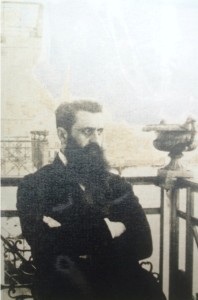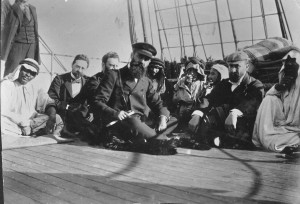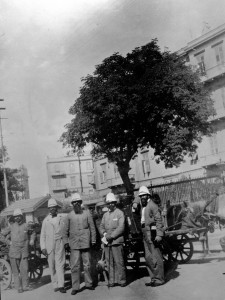David Ben-Gurion on Herzl, Zionism and Zion
Matia Kam
“News swept through the town: Messiah has arrived”

David Ben-Gurion (1886-1973) did not meet, nor did he get to see Benjamin Ze’ev Theodore Herzl (1860-1904). But that image of Herzl as the messiah, was etched in Ben-Gurion’s memory. It was Herzl who brought to the town of Plonsk, where Ben Gurion grew up, the Zionist message. Eight years later, Herzl died unexpectedly and Ben-Gurion wrote of the shock at his untimely death, which dashed so many Jewish hopes. “In the summer of 1904 our town was stunned by the news: Herzl was dead. It is hard to describe what a blow it was for all of us, young and old. I was profoundly depressed—darkness filled my world, the light was gone from my life.”
Two weeks after Herzl’s death Ben-Gurion wrote to a friend in New York: “ Our hopes and our dreams are orphaned! The one who awakened and cultivated them just died. Placed in a dark grave […]chill and gloom all around.” Ben-Gurion was 18 years old. He was however, already familiar with Jewish history and understood the magnitude of the role that Herzl played in it. “Only once in a thousand
years does such an amazing leader emerge.” Yet he believed that while Herzl’s life was short, his visionary leadership was a turning point in Jewish history, and would set his eternal mark on it; “the sun is gone, but its lights is here to remain”.[1]
Fifty years after Herzel’s death, Ben-Gurion noted that Herzl was “a visionary who captivated the hearts of people no less than his vision.” In his short life Herzl became “a living legend.” In coining the phrase, “The Jewish State”, the Jews could hear the vision of redemption they have been waiting for throughout the generation.[2] In Jewish history, “he was a splendid meteor bringing light to the dark and gloomy skies of Jewish exile.”
Under the wings of Israel’ Shekhina
The state of Israel brought Herzl’s bones to be buried in Jerusalem. In the Knesset Ben-Gurion read Herzl’s prophetic words written in his journal in 1898, six years before his death. “I don’t know the time of my death, but Zionism will not die. Since the Basel Congress the Jewish people have acquired a representation and a presence and the Jewish state will be founded in its homeland.” Ben Gurion mentioned that at the end of the first Zionist Congress (1897) Herzl wrote in his diary “In Basel I founded the Jewish state”—but he didn’t dare utter it in public that day for fear that the audience would laugh at him.[3] Herzl did say, “in five years, at the most in 50 years the state will be recognized by all.”

The day of Herzl’s memorial in the Israeli Knesset in 1948 was in fact 51 years after the first Zioinst Congress; Ben-Gurion noted that “Herzl’s vision did become a reality.”[4] He reminded his audience that in his book The Jewish State Herzl wrote that he could hear the wings of the Presence of Israel’s Shekhinah. Ben Gurion added that this Shekhinah “did not disappear even after his death–Herzl the mortal of flesh and blood died, yet the prophet and the national visionary are eternal, he was destined by Providence to become an everlasting presence in the history of Israel.”
To bring Herzl’s bones to Jerusalem was meant not as a funeral but as a commemorative precession. In an analogy between past and present, between new history and biblical historiography, Ben-Gurion declared that “in the history of the people of Israel only two persons were honored to have their bones brought to a burial in the land by their redeemed people […] A span of 3300 years separated them, the first one took place after the Exodus from Egypt as the Israelites brought Joseph’s, son of Jacob, bones”; and like Joseph—Benyamin Ze’ev Herzl was first put to rest in exile. As Joseph made his brothers vow that they would bring his bones out of Egypt, so did Herzl ask the Jewish people in his Will to bring “my body to the land of Israel.” Ben Gurion noted that, “Herzel enjoyed the privilege that even the greatest of leaders and prophets of all times, Moses, did not receive.[5]
“An ancient idea captured his heart – and captured the people of Israel”
For Ben-Gurion Zionism was not some new political thought and a new idea of a nation-state, but a renewed fulfillment of an ancient Jewish vision of redemption, “The Zionist idea is the historic idea of the Jewish nation […] throughout the generations.”[6] Ben-Gurion emphasized that the yearning of the Jewish people for renewed independence in its ancient homeland was never abandoned, it accompanied the people in exile, and every Jew prayed three times a day to return to Zion and bring back its peoplehood. Thus he concluded that,“Herzl did not invent the Zionist Idea and did not renovate the vision of a Jewish state.” Yet, Herzl had the gift of “deep intuition of a historic visionary and was cable of changing the course of Jewish history. This was his greatness.”[7]

He was able to breath “a new spirit, a spirit of practicable will” into the ancient yearnings of the Jewish people. Herzl, as Ben-Gurion saw it, had the unique gift of outlining “national architecture”, constructing an encompassing Jewish platform – the Zionist Congress and the Zionist Organization–and his ability to mobilize “the mass of Jews as a political, national and international tool.”[8]
Ben-Gurion found confirmation to his view on Herzl in what Herzl wrote a year before the first Jewish Congress (1896) “I am not offering any new ideas, on the contrary: This is a very ancient idea—and therein lies its power; the idea is as old as the nation that has never abandoned it—even in its darkest tragic moments, the idea—to renew the Jewish state.” Ben-Gurion quoted from Herzl’s admission, “I am not a prophet and not a visionary,” but was hopeful that his vision would spark the nation of Israel “one of these days,” and “the people will be fired up with great enthusiasm.”
Indeed Herzl achieved what no one has done before him—to pick up historic ideas and turn them into a creative revolutionary force that molds reality: “an old idea bloomed in his heart, and his faith, personal charm and charisma and great undertakings turned it into a new idea, alive, dynamic, heart-catching, inspiring hope and faith, that stretched the back of the Jewish people and turned it into effective political and international force– and so the idea has become a reality.”[9]
Herzl was born with the crown on his head and was the people’s choice even before anyone voted for him, since “it was not the Congress that chose Herzl, instead it was the people who already recognized him as a beloved leader”.[10] Ben Gurion thought that Herzl forged his place in Jewish history “in two words: [A] Jewish State.” The words Jewish State expressed “a virtuoso simplicity, deep faith and contagious enthusiasm”; he brought a breath of fresh air into the soul in the Jewish people and awakened “an ancient hope that was dormant in the heart of the people throughout the generations”.[11]
Translated from the Hebrew by Ayala Emmett
[1] David Ben-Gurion, Memoirs, Am Oved Publishers, 1971, Vol. 1 pp. 7′ 12 – 13/
[2] David Ben-Gurion, Vision and Way, Am Oved Publishers,Vol. 5, 1957, p. 68.
[3] David Ben-Gurion, Vision and Way, Am Oved Publishers,Vol.1, 1951, pp. 247 – 249.
[4] David Ben-Gurion, Israel Fighting, Am Oved Publishers, 1957, pp. 198 – 203.
[5] David Ben-Gurion, Vision and Way, Vol.1, ibid.
[6][6]David Ben-Gurion, Vision and Way, Vol. 4, 1952, p. 116.
[7] David Ben-Gurion, Vision and Way, Vol. 5, p. 78.
[8] David Ben-Gurion, Israel Fighting, p. 199.
[9] David Ben-Gurion, Vision and Way, Vol. 1, p. 248.
[10] David Ben-Gurion, Vision and Way, Vol. 4, p. 124.
[11] David Ben-Gurion, Vision and Way, Vol.5, p. 68.